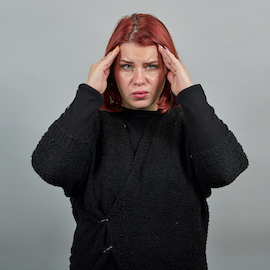 Stress has become a major problem in recent years, affecting millions of people from all ages and backgrounds. Many people don’t realise that stress can cause a wide range of physical symptoms and chronic health problems. Here are 10 common physical symptoms associated with stress.
Stress has become a major problem in recent years, affecting millions of people from all ages and backgrounds. Many people don’t realise that stress can cause a wide range of physical symptoms and chronic health problems. Here are 10 common physical symptoms associated with stress.
- Headaches
Headaches and migraines are often caused by emotional stress and physical tension. Tension headaches can feel like a tight band around the forehead and scalp. Migraines are usually one-sided headaches with severe, pulsating pain and often come with other symptoms, such as nausea and sensitivity to light.
- Digestive Problems
Chronic stress can affect the digestive system, leading to a wide range of symptoms, such as heartburn, acid indigestion, gastroesophageal reflux disease (GERD), stomach cramps, abdominal pain, nausea and vomiting. It can also cause bowel problems, including constipation, diarrhea and irritable bowel syndrome (IBS).
- Sciatica
Sciatica and lower back pain can be caused by chronic physical tension. When you’re under significant stress, muscles can easily become tense and sore, leading to spasms, cramps and strained muscles. Neck and shoulder pain are also common problems, especially if your neck muscles are tight or strained.
- Breathing Difficulties
Stress and anxiety can result in shallow breathing, which leads to hyperventilation (excessive breathing). Hyperventilation can cause a feeling of tightness in the chest and throat. Some people also experience shortness of breath or the sensation of having a lump in the throat. These sensations will not harm you, but they can be extremely unpleasant.
- Chest Pain
Chest pain can be caused by muscle tension or hyperventilation. Sore chest muscles, pain around the breastbone or ribs and palpitations can all be caused by stress. However, if you have severe chest pain, you must seek urgent medical advice as soon as possible, especially if the pain radiates to your jaw or left arm.
- Fatigue
Fatigue is one of the most common symptoms of stress, anxiety and depression. The physical and emotional impact of stress can leave you feeling drained and exhausted, making it difficult to keep up with your normal daily activities. You may also struggle to stay awake while engaged in routine tasks, watching television, reading a book or traveling long distances.
- Reduced Cognition
Stress and anxiety can cause cognitive problems, such as a shorter attention span and difficulties with concentration or making sense of information. You may also experience stress-related memory loss, which affects short-term memory, ability to recall information (e.g., passwords) and makes it more difficult to learn new things.
- Infections
Chronic stress can suppress the immune system and lower your resistance to common infections, such as colds, flu and stomach bugs. Minor cuts and damage to the skin may become infected more easily than usual. In addition, you may become more sensitive to allergens, such as pollen, dust or specific foods.
- Visual Distortions
Stress can affect your vision. Some people notice blurred, cloudy, snowy or tunnel vision, while others experience flashing lights, patterns or lines when they look at certain objects. Some people also experience visual hallucinations when falling asleep (hypnagogic hallucinations) or when waking up (hypnopompic hallucinations). These hallucinations can be scary and extremely distressing for some people.
- Insomnia
Insomnia is another common problem that is often caused by stress. Racing thoughts, ruminating and constant worrying can make it difficult to sleep. Physical tension and pain can also make it difficult to get a good night’s sleep. In addition, stress can sometimes lead to night terrors and disturbing dreams.
Stress can cause a wide range of physical symptoms, including headaches, digestive problems, sciatica, breathing difficulties, chest pain, fatigue, reduced cognition, infections, visual distortions and insomnia. Although these symptoms can be distressing, they will usually subside once the cause of the stress has been identified and successfully treated.